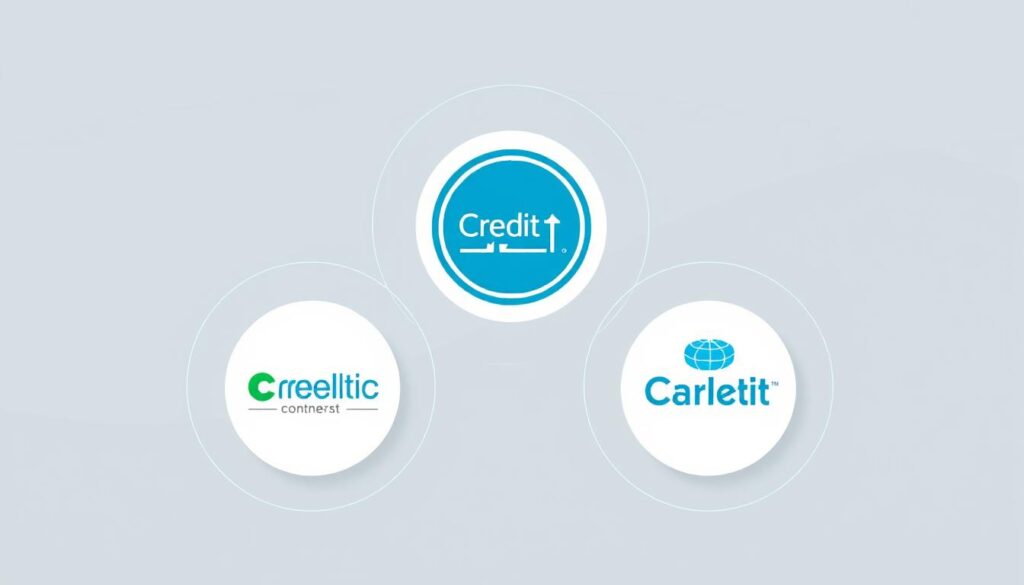Managing credit reports and scores can be tough. But knowing how to reach the three major credit bureaus makes it easier. Equifax, Experian, and TransUnion compile and maintain your credit history.
These agencies play a crucial role in your financial well-being. Having their contact info helps you take control of your credit information. You can dispute inaccuracies and ensure your creditworthiness is correctly shown.
We’ll share the key contact details for these credit reporting agencies. You’ll learn how to request credit reports and inquire about your score. We’ll also show you how to resolve any discrepancies you might find.
Key Takeaways
- Understand the importance of the three major credit bureaus and their role in your financial decisions.
- Familiarize yourself with the contact information for Equifax, Experian, and TransUnion to effectively manage your credit reports and scores.
- Learn how to dispute errors or discrepancies on your credit reports with the appropriate credit bureau.
- Discover the benefits of credit monitoring services to stay informed and secure your credit profile.
- Explore strategies for building and maintaining good credit habits to improve your overall financial health.
Understanding the Importance of Credit Bureaus
Credit bureaus are essential in our financial world. They gather and keep records of our credit history. These reports help lenders, landlords, and employers make important decisions about our creditworthiness.
What Are Credit Bureaus?
Credit bureaus collect information about people’s credit histories. The three major credit bureaus in the U.S. are Experian, TransUnion, and Equifax. They gather data from credit card companies, banks, and other lenders.
This information helps create detailed credit profiles for consumers. These profiles show payment patterns, loan amounts, and credit use.
The Role of Credit Bureaus in Financial Decisions
Credit reports and scores are crucial for many financial choices. Lenders use them to assess the risk of lending to someone. This affects interest rates, loan amounts, and credit limits.
Landlords may check credit reports to predict on-time rent payments. Some employers review credit histories when hiring new staff.
Knowing about credit bureaus is key to managing your finances. By checking your reports, you can spot and fix errors. This ensures your creditworthiness is correct.
With this knowledge, you can make smart choices. It helps you take steps to keep a healthy credit profile.
| Credit Bureau | Contact Information |
|---|---|
| Experian | Phone: 1-888-397-3742 |
| TransUnion | Phone: 1-800-916-8800 |
| Equifax | Phone: 1-800-685-1111 |
Experian: Your Key to Credit Information
Experian is a major credit bureau in the United States. It gives people access to their credit reports. Experian also offers tools to help you make smart money choices.
Experian’s team can help with many credit questions. They can assist you in getting your credit report or fixing mistakes. You can call Experian at 1-888-397-3742. Or, visit www.experian.com to use their services online.
The credit bureaus customer service team is here to help. They can explain your credit profile and show you how to keep a good credit score. They’re ready to answer your questions about credit reports and monitoring tools.
| Service | Contact Information |
|---|---|
| Credit Report Inquiries | 1-888-397-3742 |
| Credit Monitoring Services | 1-888-397-3742 |
| Dispute Resolution | 1-888-397-3742 |
| General Inquiries | 1-888-397-3742 |
Using Experian helps you manage your credit info. It ensures your financial profile shows your true credit worth. Knowing your credit is key to reaching your money goals.

TransUnion: Empowering You with Credit Knowledge
TransUnion is a major credit bureau that impacts your financial life. It offers services to help you understand and control your credit profile. Let’s explore how TransUnion can help you manage your credit effectively.
TransUnion’s Services
TransUnion provides a range of useful services for consumers. Their credit reports show your credit history in detail. This allows you to track your credit activity and spot any errors.
They also offer credit monitoring services. These alert you to changes in your credit profile. This way, you can act quickly to protect your financial health.
Protecting Your Credit with TransUnion
TransUnion offers tools to help safeguard your credit. Their identity protection services can detect and address identity theft. This keeps your personal information safe.
If you have questions about your credit report or score, TransUnion’s customer service team is ready to help. They’re available to address any concerns you might have.
TransUnion helps you understand your credit profile and monitor your finances. It’s a trusted partner in managing your credit. With TransUnion’s resources, you can make smart decisions and maintain good credit.
Equifax: Trusted Credit Reporting Agency
Equifax is a major credit bureau in the United States. It provides credit reports and scores for individuals and businesses. Equifax helps in financial decision-making processes.
You can access your credit report through Equifax. They offer credit monitoring services and help resolve discrepancies. The contact information and credit report contact details are crucial for managing your credit bureaus customer service needs.
Equifax Contact Information
- Phone: 1-800-685-1111
- Website: www.equifax.com
- Address: Equifax Information Services LLC, P.O. Box 740256, Atlanta, GA 30374-0256
Equifax offers various credit report contact options. You can request your credit report or dispute an item easily. Their customer service team is ready to help with your credit bureaus customer service questions.
“Equifax is committed to helping consumers better understand their credit and how to manage it responsibly.”
Equifax’s resources help you stay informed about your credit standing. You can make better financial decisions with their services. They support maintaining a healthy credit report contact and credit bureaus customer service.
Navigating Credit Reports and Scores
Your credit report holds key financial information. It’s used by lenders to assess your creditworthiness. Learning to read it helps you control your credit profile.
By understanding your report, you can make smart financial choices. This knowledge empowers you to shape your financial future.
Reading and Understanding Your Credit Report
Your credit report has several important sections. Each part offers insights into your credit history and financial habits.
- Personal Information – This section lists your name, address, Social Security number, and other identifying details.
- Account Information – Here, you’ll find details about your current and past credit accounts, including the type of account, balance, payment history, and credit limits.
- Public Records – Any public records related to your financial history, such as bankruptcies, tax liens, or court judgments, are listed in this section.
- Inquiries – This section shows a record of who has accessed your credit report, which can include both hard and soft inquiries.
Review each section of your credit report carefully. Look for any errors that might hurt your credit score.
Fixing these issues helps maintain a healthy credit profile. It can improve your access to financial products.
Remember, credit report contact, credit bureaus customer service, and credit reporting agencies contacts are essential resources for managing your credit report and ensuring its accuracy.
Three Major Credit Bureaus Contact Numbers
Credit reports and scores can be confusing. Having contact info for Experian, TransUnion, and Equifax helps simplify things. These numbers connect you with experts who can help.
You can access your credit report, dispute errors, or ask about your credit standing. The right contact information makes this process easier.
| Credit Bureau | Contact Number |
|---|---|
| Experian | 1-888-397-3742 |
| TransUnion | 1-800-916-8800 |
| Equifax | 1-800-685-1111 |
These toll-free numbers connect you to three major credit bureaus’ customer service representatives. They can help with various credit-related questions and requests. You can ask for your credit report or dispute errors.
These numbers are your key to a better financial future. Understanding your credit bureaus’ contact options is crucial.
“Knowing where to find the three major credit bureaus’ contact numbers is the first step in taking control of your credit and financial well-being.”

Keep these numbers handy to manage your credit actively. Stay informed and address any issues that come up. Your credit report and score are crucial parts of your financial identity.
Stay connected with credit bureaus’ customer service to maintain a healthy credit profile. It’s an important step towards financial success.
Disputing Errors on Your Credit Report
Credit report mistakes can harm your financial health. It’s vital to know common dispute reasons and the resolution process. This helps maintain your credit history’s accuracy.
Understanding these elements allows you to protect your financial future. You can take action to correct any errors you find.
Common Reasons for Disputes
Credit report errors can come from various sources. These include wrong personal info, account details, or fraud. Here are some frequent reasons for disputes:
- Incorrect personal information, such as name, address, or date of birth
- Accounts that do not belong to you or are incorrectly reported as delinquent
- Inaccurate information about your payment history, credit limits, or balances
- Outdated or unverified information that remains on your report
- Identity theft or unauthorized accounts opened in your name
The Dispute Resolution Process
If you spot errors on your credit report, act quickly. The dispute process usually involves these steps:
- Review your credit report thoroughly and identify the specific errors or inaccuracies.
- Contact the credit bureaus (Experian, TransUnion, and Equifax) directly to dispute the errors. You can do this online, by phone, or by mail.
- Provide supporting documentation, such as bills, statements, or other records, to substantiate your claims.
- The credit bureaus will investigate the dispute and provide you with the results within 30-45 days.
- If the dispute is resolved in your favor, the credit bureaus will correct the information on your credit report.
Good communication is key when disputing credit report errors. Be persistent in your efforts to address inaccuracies. This helps protect your credit score.
Taking action ensures your financial choices reflect your true creditworthiness. Don’t hesitate to start the dispute process if you find errors.
Protecting Your Credit from Identity Theft
Identity theft is a serious threat to your credit and finances. It’s vital to know how to prevent, spot, and deal with it. The credit report contact, credit bureaus customer service, and credit reporting agencies contacts are key players in this fight.
Guard your personal info to prevent identity theft. Keep your credit report contact and Social Security number safe. Check your credit bureaus customer service statements often. Watch your credit reporting agencies contacts for odd activity.
Act fast if you’re a victim of identity theft. Contact the three major credit bureaus immediately to place a fraud alert on your credit file and dispute any unauthorized activity. Report the theft to the Federal Trade Commission and local police.
“Identity theft can have a devastating impact on your financial well-being. Proactive measures and a quick response are essential to safeguarding your credit and reclaiming your identity.”
Recovering from identity theft takes time and effort. Use credit monitoring services to stay alert. Work with credit bureaus customer service reps to keep your credit profile accurate.

Stay alert and act quickly if you suspect identity theft. Use the help of credit bureaus and consumer agencies. These steps will protect your credit and financial future.
Credit Monitoring: Stay Informed and Secure
Staying on top of your credit profile is crucial in our digital world. Credit monitoring services help safeguard your financial well-being. They allow you to access your credit report contact and monitor your credit bureaus customer service.
This ensures your credit reporting agencies contacts remain secure and accurate. Regular checks can help detect any suspicious activity quickly.
Benefits of Credit Monitoring Services
Credit monitoring services offer a comprehensive solution for maintaining a healthy credit profile. They provide several key benefits to users.
- Regular access to your credit reports – Gain insight into your credit history and identify any potential errors or discrepancies.
- Timely alerts for credit changes – Receive notifications of any significant changes to your credit, including new accounts, inquiries, or suspicious activity.
- Assistance in addressing credit issues – If you do encounter a problem, credit monitoring services can guide you through the process of resolving disputes and protecting your credit.
These features keep you informed and secure about your credit status. They empower you to make smart financial decisions.
Credit monitoring services can be your ally in maintaining a healthy credit profile. They help manage your credit report contact, credit bureaus customer service, and credit reporting agencies contacts.
Credit Repair: Improving Your Credit Score
Credit repair services can transform your financial situation. These experts identify and address issues affecting your creditworthiness. They help enhance your credit profile, opening doors to better opportunities.
The process starts with a thorough review of your credit report. Professionals look for inaccuracies, errors, or fraudulent activities. They work with credit bureaus customer service to dispute discrepancies.
This ensures your credit report accurately reflects your financial history. Credit reporting agencies contacts play a crucial role in this process.
- Obtain your credit reports from the three major credit bureaus: Experian, TransUnion, and Equifax.
- Carefully review your reports and identify any errors or inaccuracies.
- Dispute the identified issues with the respective credit bureaus customer service departments.
- Monitor your credit reports for changes and follow up on the dispute resolution process.
- Implement strategies to build and maintain a strong credit history, such as responsible credit usage and payment history.
| Credit Repair Strategies | Benefits |
|---|---|
| Dispute Errors and Inaccuracies | Improve credit score by removing negative items |
| Negotiate with Creditors | Reduce debt and interest rates |
| Develop a Personalized Credit Repair Plan | Tailor solutions to your specific credit challenges |
“Repairing your credit can open up a world of financial opportunities, from better interest rates on loans to improved chances of approval for mortgages, credit cards, and more.”
Credit repair services help you regain control of your financial future. They guide you towards a stronger, more stable credit profile. Patience and persistence are vital for improving your credit report contact.

Building and Maintaining Good Credit Habits
Good credit habits are key to financial success. By using credit wisely, you can build a strong profile and control your financial future.
These habits help you establish a solid credit foundation. They also open doors to better financial opportunities.
Responsible Credit Usage Tips
To build and maintain good credit, try these strategies:
- Make timely payments: Always pay your credit card and loan bills on time. Even a single late payment can have a negative impact on your credit score.
- Keep credit utilization low: Use less than 30% of your available credit limit. High usage can signal financial risk to lenders.
- Monitor your credit report regularly: Check for errors or suspicious activity. Contact credit bureaus if you spot any issues.
- Limit new credit applications: Each application can lower your score temporarily. Only apply for new credit when needed.
- Diversify your credit mix: Have different types of credit. This shows you can manage various forms of credit responsibly.
These tips help build a strong credit history. They also maintain a healthy credit profile.
Good credit makes you more attractive to lenders. It can lead to better loan terms and financial opportunities.
“Good credit is not just about having a high credit score – it’s about developing and maintaining healthy financial habits that will serve you well in the long run.”
| Credit Usage Tip | Benefit |
|---|---|
| Make timely payments | Avoids late payment penalties and protects your credit score |
| Keep credit utilization low | Demonstrates responsible credit management to lenders |
| Monitor your credit report | Helps identify and resolve any errors or fraudulent activities |
| Limit new credit applications | Minimizes the impact of hard inquiries on your credit score |
| Diversify your credit mix | Shows your ability to handle different types of credit responsibly |
Frequently Asked Questions About Credit Bureaus
Understanding credit bureaus can be tricky. Let’s explore common questions about credit reporting agencies. We’ll cover how they affect your credit report contact and credit bureaus customer service.
What is the difference between the three major credit reporting agencies contacts?
Experian, TransUnion, and Equifax are the three major credit bureaus. Each collects and maintains its own credit information about consumers. They may have different data and scoring models.
This can lead to variations in your credit report.
How can I obtain my credit report from the bureaus?
You can get a free annual credit report from each major bureau. Request reports through AnnualCreditReport.com or contact the bureaus directly.
What should I do if I find errors on my credit report?
If you spot errors on your credit report, dispute them with the credit bureaus customer service. The bureaus must investigate and fix any verified mistakes.
How can I monitor my credit and protect myself from identity theft?
Regularly check your credit reports to stay informed. Use credit monitoring services to detect suspicious activity. This proactive approach can guard against credit reporting agencies contacts-related identity theft.
| Credit Bureau | Contact Information |
|---|---|
| Experian | 1-888-397-3742 |
| TransUnion | 1-800-888-4213 |
| Equifax | 1-800-685-1111 |
Stay informed about your credit report contact and credit bureaus customer service. This helps maintain a healthy credit profile. It also secures your financial future.
Conclusion
We’ve explored the key roles of Equifax, Experian, and TransUnion. These credit bureaus shape your financial future. You now have their contact info to manage your credit reports effectively.
Credit bureaus play a crucial role in financial decisions. With this knowledge, you can build a strong credit profile. You can reach out to the three major credit bureaus for credit report contact anytime.
Your credit report and score are vital for loans and mortgages. Stay informed about these credit bureau services. This will help you achieve your financial goals confidently.
Use the credit bureaus customer service when needed. It’s a valuable resource for maintaining your creditworthiness. Take control of your financial future today.

